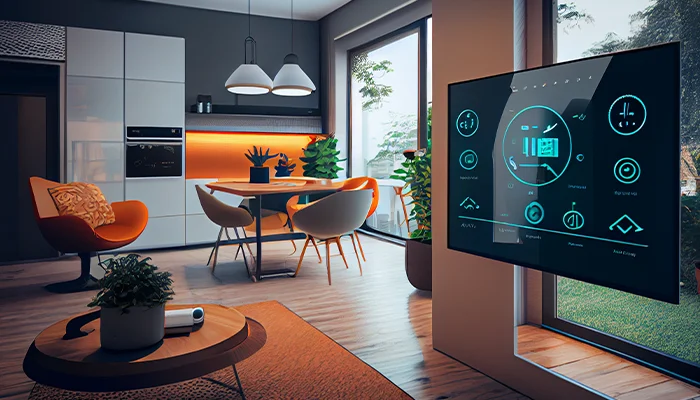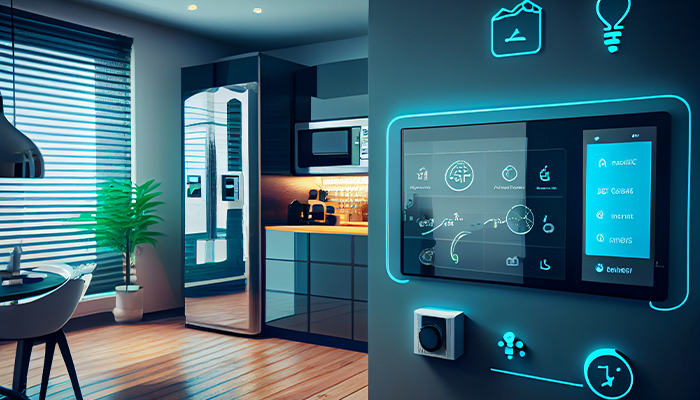5 Must-Have Features of a Smart Home

JAN, 05, 2024 03:57 PM
5 Must-Have Features of a Smart Home
Smart home technology represents more than a trendy gadget or trend; it represents the future of homeowner connectivity and convenience. Smart home can make life more comfortable, efficient, and enjoyable while saving energy and freeing up precious time—real tangible advantages in today's ever-evolving society.
Do you want greater precision when regulating the temperature in your home or to install a smart security system to make your property safer? Installing smart devices will make life simpler at home. Smart home technologies provide numerous advantages; now is an excellent time to explore them further!
What is a Smart Home?
Smart home are home setups that incorporate devices and appliances to automate tasks, providing remote access and control. Smart appliances may be integrated seamlessly into the building structure or added later; their control may come via apps, software, switches, remote controls, voice command technology, or artificial intelligence systems.
Planning the transformation of your home into a smart one may be a daunting yet rewarding task. While some individuals only require purchasing and connecting one smart speaker with other devices like lights or thermostats, others might require more complex integration involving speakers, cameras, TVs, computers, and security systems for locks. This way, you're harnessing technology more conveniently while making life more convenient overall! Making your house smart can bring peace of mind to both the owner and the resident!
Benefits of Smart home
Home automation provides homeowners with access to cutting-edge technologies while at the same time saving them money in energy costs and maintenance expenses, increasing home security, and decreasing energy use overall. Smart home can benefit any household, whether they install just one device or multiple systems.
-
Experience immediate comfort gains
Smart home offer many advantages, the primary one being increased comfort. Smart home features can help simplify life and give you more time for what matters. A connected smart home allows you to easily control its functions without lifting a finger!
-
Improved Security
Your home may feel like an oasis, but that doesn't have to be true. All it needs to be smart for maximum protection are smart security systems that allow it to monitor itself and alert you if something goes amiss, no matter where you are or who has access to the internet. With smart locks, cameras, sensors, and lights all interconnected, it becomes easier than ever to keep an eye on everything that happens within its boundaries, whether at work, on vacation, or even from your bedroom!
-
Energy Savings
Home automation can be an efficient and simple way to conserve energy and streamline a complex system. Smart home technology provides you with easy ways to run your home more efficiently while saving money on energy bills. Smart thermostats help control heating and cooling more effectively, while smart plugs, lights, and appliances can all be shut off when they're no longer being used.
-
Ways to be Eco-Friendly
Intelligent home technology can help save both money and the planet at the same time. There are countless smart devices available to reduce energy usage and your impact on it; thermostats, for instance, can automatically regulate temperatures to maximize comfort and efficiency, while window sensors prevent energy loss due to open windows. Be smart: help save our world, one smart home at a time!
-
How to Add Charm and Entice Visitors Into Your Home
Smart home give you more control over how you relax and unwind at home, thanks to modern technology. Smart speakers, for instance, allow us to entertain ourselves with style. Speakers like those found on smart speakers can control TVs and gaming systems while playing music or podcasts or bringing you up-to-date news—perfect if you want seamless audio in multiple rooms with an integrated multi-room system.
-
Remote monitoring and control
One of the key benefits of smart home is the ability to monitor and control your home remotely. Whether you're at work, on vacation, or simply in another room, smart home systems allow you to check on your home's status and make adjustments through your smartphone or other connected devices. Forgot to lock the door? Want to adjust the thermostat before you arrive home? With smart home technology, you can do it all with a few taps on your device, providing you with peace of mind and convenience.
-
Customization and personalization
Smart home devices offer a high level of customization to suit individual preferences and routines. From lighting and temperature to entertainment systems, you can tailor your smart home setup to meet your specific needs. Smart assistants, such as Amazon's Alexa or Google Assistant, can learn your habits and preferences, making your home adapt to your lifestyle seamlessly. This personalization not only enhances convenience but also contributes to a more enjoyable living experience.
-
Increased Home Value
Investing in smart home technology can enhance the value of your property. Many homebuyers today are attracted to the idea of a fully equipped smart home, as it signifies modernity, convenience, and energy efficiency. Smart features, such as integrated security systems, smart thermostats, and automated lighting, can make your home stand out in the real estate market, potentially increasing its resale value.
-
Health and well-being
Smart home devices are increasingly incorporating features that promote health and well-being. From smart mattresses that monitor sleep patterns to air quality sensors that alert you to potential issues, these technologies contribute to creating a healthier living environment. Smart home can help you maintain a comfortable and healthy lifestyle by optimizing factors like lighting, temperature, and air quality based on your preferences and needs.
Smart Home Connectivity

Internet of Things devices connect to the Internet using various methods, with Wi-Fi being the most prevalent. Security cameras and systems typically offer both cell phone backup and landline backup, while Z-Wave and ZigBee may be less commonly utilized. You can get help from an IOT app development company.
Wi-Fi (as a replacement) is a wireless network technology used by IoT gadgets to connect quickly to the internet. WiFi uses radiofrequency technology to establish this connection; most connected devices connect directly with your app using this method. For devices that require extra protection, such as motion detectors for security, however, you might wish to add cell or landline backup in case WiFi goes down; we discuss this below.
Bluetooth is the wireless technology that connects your AirPods or smart speaker to the radio in your car. Bluetooth uses short-wavelength radio signals for transmission; it is most often found in car stereos, hands-free headphones, mice, keyboards, and printers, but increasingly smart home security solutions also use it.
Z-Wave (low-energy radio waves) is an open wireless protocol used to connect devices through an app and between themselves. Over 26,000 devices used Z-Wave in 2019, making it one of the more widely adopted solutions.
Zigbee is another communication protocol that creates networks using digital radios. Zigbee is cheaper than WiFi and Bluetooth due to requiring data transmission over shorter ranges, which uses less energy, while its networks are all symmetrically encoded, making it one of the safest options available.
Why can't security systems use data like your phone does? Some security companies utilize cellular data as a backup in the event of a power outage; usually, a monthly or annual fee applies, sometimes built directly into base stations and alarm panels via cell communicator devices.
Home security may include installing a landline backup solution if you own one at home. A landline is wired or cabled directly into a communication system, and this type of system allows police to instantly know your location in case they call, unlike mobile devices with less-than-ideal GPS systems. Landlines provide great peace of mind even in today's smartphone-centric society; consider them when upgrading home security measures!
5 Must-Have Features of a Smart Home
Here are the features of a smart home to maximize its value:
-
Efficient energy consumption
An efficient energy consumption management system can bring numerous advantages. Not only will it add sustainability to how you consume, but it will also save energy costs, providing the ideal solution for both people and the planet alike!
-
Intelligent water detection and management systems
Leaks and water waste pose an immediate threat to your wallet, house maintenance budget, and environment. Smart home should incorporate systems capable of instantly detecting leaks, sending alerts via text message to notify residents immediately of a problem, and even temporarily disabling water supply if necessary.
Shield Management will save you both time and money by providing an effective system to oversee the property. Repairs can be scheduled immediately, knowing that there's no urgent need to return home in case of water damage, saving thousands in repair costs.
Reduced water waste has an environmental benefit, making it essential in light of climate change.
-
Security System
It is imperative that a fully automated security system be installed in your smart house in order to guarantee its protection and peace of mind. Notification will also be sent out when suspicious activities take place, even when you're not present, enabling you to inform authorities as necessary and keep both yourself and your family secure.
-
Smoke detection and alerts
Early detection of smoke and fire can have a significant effect on your safety. Should there be an outbreak, Tantiv4 Shield Management's system will alert you automatically and activate sprinklers to help limit its spread; additionally, their toxic fume detection feature will immediately warn them.
Your alerts allow you to evacuate until the fire department or other authorities have taken care of any fire or smoke issues.
-
Home Automation
Smart home should include home automation as a part of their everyday routine. You can remotely manage entertainment, lighting, and electrical appliances using home automation; remote scheduling adds efficiency to daily schedules while saving energy thanks to automated light switch-off systems that turn off at night automatically.
Your system can be set to follow your custom routines. Awake to a hot cup of coffee before having water heated for your shower!
Final Thoughts
We hope that you enjoyed our list of five essential components for creating a smart house. Shield management offers these features and is compatible with Google Assistant and Amazon Alexa for the seamless operation of a smart house.
Strategy
Design
Blockchain Solution
Development
Launching
Testing
Maintenance
Contact US!
India

Plot 378-379, Udyog Vihar Phase 4 Rd, near nokia building, Electronic City, Phase IV, Udyog Vihar, Sector 19, Gurugram, Haryana 122015
Copyright © 2026 PerfectionGeeks Technologies | All Rights Reserved | Policy
Contact US!
India 
Plot 378-379, Udyog Vihar Phase 4 Rd, near nokia building, Electronic City, Phase IV, Sector 19, Gurugram, Haryana 122015
Copyright © 2026 PerfectionGeeks Technologies | All Rights Reserved | Policy






